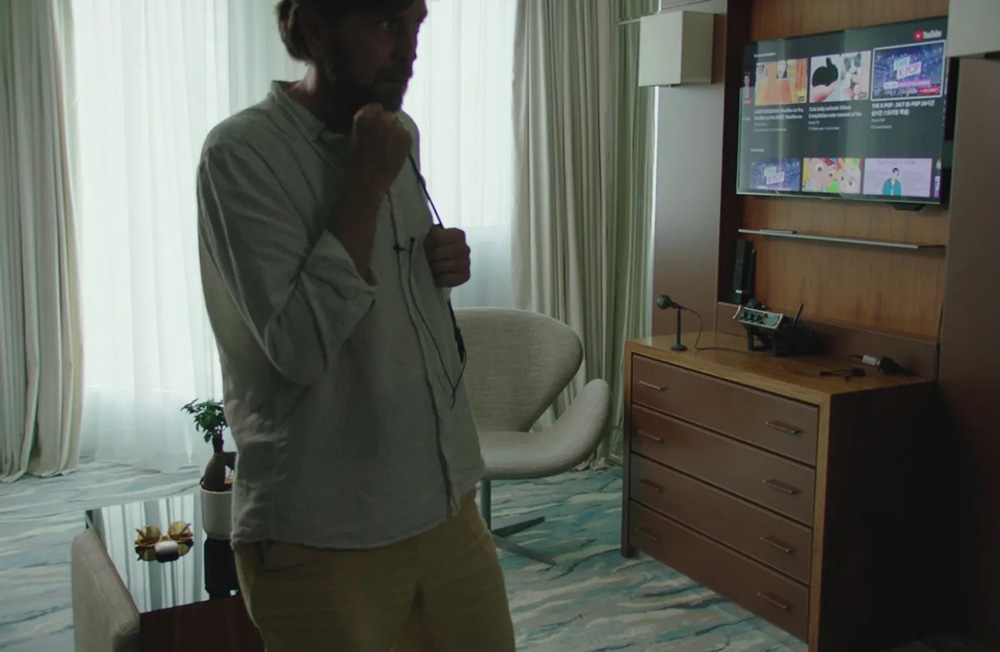“At some point, you no longer feel the world is yours,” Audrey Diwan can be heard saying in “Room 999,” asked to articulate her thoughts on the current state of cinema and whether it will live on. For the director who took the world by storm with just her second directorial effort “Happening” less than a year before director Lubna Playoust catches in her at Cannes in 2022, this comes across as a particularly dire pronouncement, having only just arrived, but watching her kids experience media, she observes, “It’s like they’re watching while they’re blinking,” describing the different needs they have for narrative context that seem to be out of line with how stories are currently told in film, including her own, when they are much more accustomed to watching short videos that can provide instant gratification.
There’s a sense that “Room 999” seems future proof in this regard when one can easily imagine a long, healthy afterlife on the Internet in bits and pieces when a collection of world-class filmmakers, fresh off walking the Croisette are brought into a hotel room just nearby to ruminate on the technological and cultural shifts that have posed existential threats to the artform, offering insights that are both memorable and memeable. Some comfort for cinephiles can be taken immediately when the film is actually a reworking of “Room 666,” a similar experiment that Wim Wenders conducted in the exact same location near the Paris airport in 1982, posing the same questions about the viability of the medium when feeling a homogenization of the form to the likes of Jean-Luc Godard, Susan Seidelman, Rainer Werner Fassbinder, Steven Spielberg and Michelangelo Antonioni and receiving the same mix of optimism and doom, and reviving the discussion alone seems like an acknowledgment its ongoing vitality rather than a nail in the coffin.
Wenders himself comes to christen “Room 999,” the only one from the original film to do, and sets the tone for the entire affair in wandering around the room that the crew exits just after positioning the camera, considering the entire history of the format from a fairground attraction to global business, the impact of digital technology as both as democratizing force and one that gradually diminishes the number of people involved in the process, and sees both the death of the form as we know it and a subsequent rebirth. With all that ground covered so thoughtfully in the opening minutes, it may seem like there’s nothing left for the 29 other filmmakers that Playoust has assembled (exceeding the 16 that Wenders invited for his film), but one would be wise to stay and the film itself makes the case for the form as an still all-too-rare space that rewards undivided attention and can convey a marketplace of ideas like no other. (Though “Babyteeth” director Shannon Murphy’s blunt appraisal of theaters letting in people with cell phones also does the trick.)
Playoust finds that if you give the room to directors, they will find ways to make it their own as Baz Luhrmann, unprompted, manages to manipulate a curtain to unveil his appearance and “Return to Seoul” director Davy Chou can’t help but be inspired to notice among the hotel’s TV offerings are both versions of “Twin Peaks,” which he cites as proof that as difficult as it may be to get original visions through the system, it isn’t impossible. There are both pessimists (James Gray, who credits his Russian Jewish upbringing ) and optimists (Joachim Trier says he wouldn’t be making movies if he wasn’t one) among the bunch and the variety of filmmakers on hand are enough to touch on every dimension of experiencing cinema in the present day and how it reaches audiences you could think of, and probably a few that have been less considered.
It’s savvy to include British director Ayo Akingbade, who has yet to direct a feature speaking to the voices that remain held back in the current environment, while Monia Chokri considers the high price of tickets, and Alice Winocour’s consultation with legendary production designer Dean Tavoularis before her sit-down yields a provocative concern about how the production flow has “standardized images.” (A similar notion was raised by Brian De Palma about the prevalence of pre-visualization in the documentary “De Palma.”) Although all the participants are said to have the floor for 12 minutes – the 1982 version limited participants to 10 due to the amount of time on a film reel – Playoust and editor Nicolás Longinotti are judicious in their editor, as it seems many of the subjects are in getting their point across, and in sharing their perspectives, “Room 999” fulfills the promise of being able to see a different side of things when opinions range so vastly but the underlying passion is shared by all.
“Room 999” does not yet have U.S. distribution.




